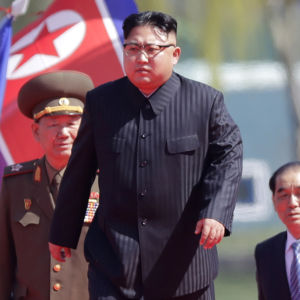The third summit between South Korea’s President Moon Jae-in and North Korea’s Kim Jong-un — their first in the North Korean capital — devolved into a talkfest in which one thing was clear: Kim is not about to give up his nukes and the missiles for carrying them to distant targets, including the United States.
He’s not giving up, though, on President Donald Trump, with whom he agreed on June 12 in Singapore to bring about “complete denuclearization.” It was “Thanks to this (U.S.-North Korea meeting),” Kim said, that “regional conditions stabilized and a more advanced outcome is expected.”
Moon, whom Kim first met in the truce village of Panmunjom on the south side of the North-South line in April, had “helped find the start of the historic North Korea-U.S. talks.”
The prospect of a second Trump-Kim summit assumed paramount importance in Moon’s meetings with Kim.
Thus Moon after the summit said Kim had “expressed willingness to continue taking additional steps” toward denuclearization, but they would be conditioned on “corresponding steps” by the United States. The statement signed by Moon and Kim said the North would even agree to “the permanent shutdown” of its main nuclear facility at Yongbyon provided the United States took “corresponding measures” a la the statement signed by Trump and Kim calling for “complete denuclearization” of the Korean peninsula.
The inference was plain: nothing would happen unless the United States agreed on a “peace declaration” viewed by Trump’s closest advisers as a prelude to a “peace treaty” under which the United States would withdraw most of its 28,500 troops from South Korea. A treaty would also mean dissolution of the U.N. Command under which U.S. and South Korean forces, and troops from 16 other countries, fought the Korean War.
Moon said Kim had agreed to shut down a site in Dongchang-ri for testing the engines of missiles, but there was no hint that North Korea would provide a list of all its nuclear facilities or an inventory of the nukes and missiles that it has already manufactured. Moon claimed, however, “the South and the North” had “discussed denuclearization steps for the first time” but did not mention “complete, verifiable irreversible denuclearization,” as the Americans have demanded.
Kim obviously viewed the outcome of the summit as a victory, saying the declaration that he signed with Moon would “open a higher level for the improvement in relations (between the South and the North) … and bring closer the era of peace and prosperity.”
Against the advice of some of those around him, notably national security adviser John Bolton, Trump appeared delighted by the results and possibly amenable to a peace declaration or at least a second summit with Kim. Trump’s tone seemed almost triumphant, as if the summit were a vindication of the rapport he claimed to have struck with Kim in Singapore.
“Kim Jong-un has agreed to allow nuclear inspections, subject to final negotiations, and to permanently dismantle a test site and launch pad in the presence of international experts,” Trump said in the tweet. “In the meantime,” he added, “there will be no Rocket or Nuclear testing.”
The test of this week’s Moon-Kim summit will not be whether the North gives up its nukes and missiles and the facilities for making them, as the Americans demand, but whether they can fulfill lesser deals reached this week. For instance, the South Koreans are closing some of their guard posts south of the military demarcation line, as agreed Wednesday, but who knows what the North Koreans are doing?
Other sensitive issues either never arose or were swiftly brushed aside. The North Koreans are saying nothing about withdrawing several hundred thousand troops within striking distance of the South or pulling back several thousand missiles that could rain fire and fury, just as Trump famously threatened last year to do to the North. Nor was anything said about systemic human rights abuses, notably those of several hundred thousand prisoners consigned to spend the rest of their shortened lives within the North’s sprawling gulag system.
But otherwise how important was the summit? We’ll know more when or if Kim pays a return visit to Seoul, as Moon said was agreed. Kim’s father, Kim Jong-il, at his summit with Kim Dae-jung in 2000, promised to visit Seoul but never made it.

